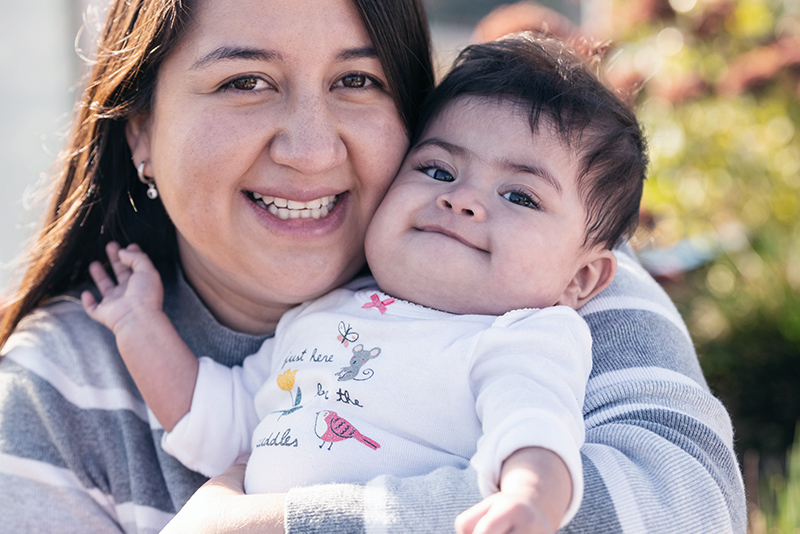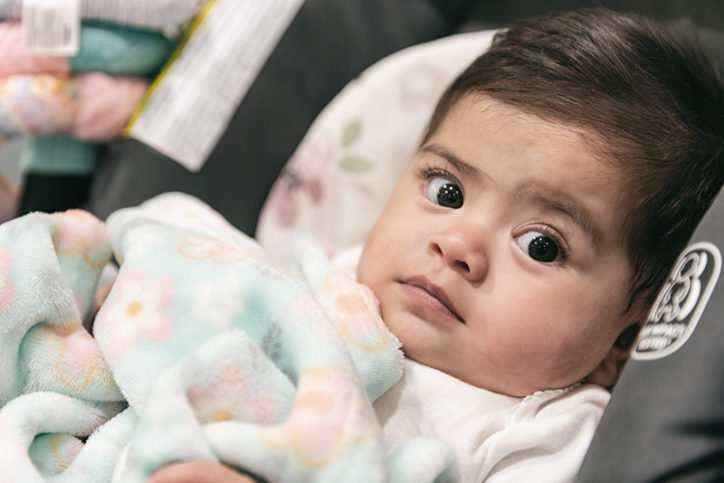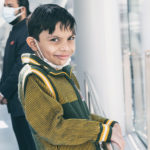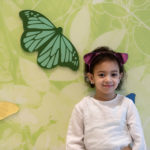Saving baby Marcela: A mother’s mission to finally hold her daughter

With expressive eyes, 11-month-old Marcela Paredes studied the smiles of onlookers as her mother held her close while exploring the rooftop garden at Boston Children’s Hospital this past fall.
It was an experience that some back in their hometown in Guatemala wouldn’t have thought possible. Doctors there said they could not treat cardiac and abdominal malformations that reduced Marcela’s oxygen flow and caused her heart to form outside of her chest cavity.
The conditions had put Marcela in such a delicate state that her parents — Isabel and Edgar — at first didn’t hold her, out of fear of harming her heart. While the lack of physical bonding between mother and infant saddened Isabel, the separation also served as fuel to her fire. Isabel embarked on a worldwide search for a surgical team that would repair her daughter’s heart.
“It gave me hope that we could keep her in our lives for a long time,” Isabel recalls.
A mother’s appeal reaches Boston Children’s
Marcela’s future seemed bleak after she was born on New Year’s Eve in 2020. Because of the COVID-19 pandemic, Isabel and Edgar could visit her at their local hospital for only 10 minutes, twice per week. After 42 days in an incubator, Marcela eventually went home, but with a warning from doctors that they did not expect her to survive. Because of her conditions, Marcela consumed no more than two ounces of food each day and cried often. Her parents were devastated but almost immediately vowed to not accept the doctors’ prognosis.
“I refused to listen to them,” Isabel says. Instead, she told Marcela she was “a warrior” and, with the help of friends and family, raised money for medical treatment that she was sure would soon come. That hope became reality when an interview Isabel gave about Marcela to the television network Univision led to a series of connections that eventually brought the family to Dr. Sitaram Emani, a cardiac surgeon and director of the Complex Biventricular Repair Program at Boston Children’s Benderson Family Heart Center. Although Isabel says she didn’t know what to expect when they first arrived at Boston Children’s in September, the staff’s compassion and the plan they had for treating Marcela put her at ease.
A successful first surgery sets stage for another
Dr. Emani confirmed that Marcela had double outlet right ventricle (DORV) with pulmonary valve stenosis, which means her heart’s two major arteries connected to the right ventricle and her pulmonary valve had a narrow opening. In a normal heart, the pulmonary artery connects to the right ventricle and the aorta connects to the left ventricle. Marcela’s conditions prevented proper blood flow to her lungs and throughout her body.
Marcela was also born with two other rare conditions: ectopia cordis — a life-threatening condition in which the heart is formed outside the chest cavity — and omphalocele, an abdominal wall weakness that causes organs to protrude through the bellybutton.
With the help of Dr. Craig Lillihei and Dr. Biren Modi, Dr. Emani and his team closed the hole in Marcela’s heart and relieved the obstruction of blood flow. The procedure went smoothly and is allowing Marcela to gain weight and acquire the strength that will be needed when, sometime in 2022, the team places her heart inside her chest cavity and reconstructs her abdominal wall. With her heart unprotected until then, Marcela wears a brace that allows her to be held safely.

The ‘warrior’ returns home to Guatemala
Happy at home: March 2023 update on Marcela
Since this story was published, Marcela returned to Boston Children’s in 2022 for her second surgery. The multi-disciplinary surgical team successfully placed her heart inside her chest cavity and reconstructed her abdominal wall.
Back home in Guatemala and now 2 years old, Marcela’s quality of life has vastly improved. She is gaining muscle strength and has ample energy to run around and play hide-and-seek with her family. Check out this video to see how this charming girl melts hearts:
After a few follow-up visits, mother and daughter are now back home in Guatemala and have reunited with Edgar and the couple’s 9-year-old daughter, Angela, who made a surprise visit to Boston in the fall to see her baby sister.
Now that they’re home, Isabel intends to introduce her daughter to extended family and friends and thank the many people who contributed to the cost of Marcela’s care.
Just like most other infants, Marcela now cries only when she’s hungry and falls asleep soon after emptying her bottle. Isabel intends to dress her as a princess for her first birthday and give her Cinderella and Sleeping Beauty dolls as presents. She is developing an even closer bond with Marcela now that she can hold her without hesitation. “The world has suddenly opened up,” she says.
“I can’t say enough about Dr. Emani and everyone who has supported us,” she says.
“I say to parents who have children facing these kinds of difficulties that hope is the last thing to lose. You should be your child’s best advocate because there are people who will help.”
Learn more about the Complex Biventricular Repair Program at Boston Children’s Benderson Family Heart Center.
Related Posts :
-

To #SavePriyanshu: A father’s reach across the world to save his son
Any parent can relate: to the ends of the earth is just the beginning of how far you will go ...
-

Saving Laila: Family travels from Egypt for answers about rare genetic condition
When Aya Hendawy got off the plane that had brought her from Egypt to Boston, she didn’t linger in ...
-

Noah the brave: A cross-country quest for a biventricular repair
If you walked down Binney Street next to Boston Children’s hospital this fall, you might’ve noticed something a ...
-

A biventricular repair helps California girl thrive
Even before their daughter, Elyse, was born, Amanda and Ian Primavera knew their road would be a little rocky. But ...





